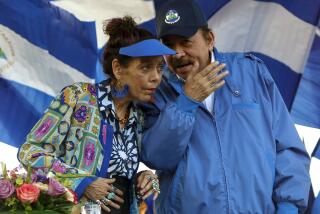Rumsfeld on Mission for Haiti Aid
BUENOS AIRES — Defense Secretary Donald H. Rumsfeld began a four-day trip here Monday to raise support for peacekeeping efforts in Haiti and to expand ties with Latin America, but he will probably find himself confronting growing tensions involving the suspension of U.S. military aid to Nicaragua.
Rumsfeld’s journey to Argentina, Brazil and Guatemala is expected to focus on helping Brazil collect on $1.2 billion in pledges for hurricane-ravaged Haiti. Brazil, which now holds the rotating presidency of the United Nations Security Council, is leading a U.N. peacekeeping mission in the Caribbean nation.
Although the Pentagon chief is not expected to visit Nicaragua, internal political rivalries there threaten to consume his stop in neighboring Guatemala.
The United States has suspended about $2.3 million in military aid to Nicaragua, U.S. officials said Monday, declaring that the Central American nation had failed to make progress on the destruction of shoulder-launched antiaircraft missiles.
Bush administration officials are concerned that Nicaragua might sell the weapons to terrorists, noting that during border skirmishes between Ecuador and Peru in the 1980s and ‘90s, the Nicaraguan army sold nearly 400 shoulder-fired missiles -- known in military parlance as manpads, or man-portable air defense systems -- to the warring countries.
The missiles are “something that can be operated by terrorists, by revolutionaries and others,” Rumsfeld said. He warned of a link “between crime and narcotics and gangs and terrorists who are willing and anxious to kill people.”
The suspension of military aid to Nicaragua comes as Sandinista leader Daniel Ortega, the nation’s former socialist president, is rallying political opposition to destruction of the missiles.
Administration officials say growing turmoil in Nicaragua stands in contrast to increasing harmony in a region once fraught with cross-border conflicts. Guatemala and El Salvador have eliminated a number of restrictions on people and goods crossing their borders. Last month, government officials agreed to form a combined Central American rapid-reaction force to deal with terrorist attacks or natural disasters.
“We definitely see this as kind of the Central American moment,” a senior Defense official said on condition of anonymity. “This is the opposite of Balkanization.”
While on his trip, Rumsfeld also is expected to offer support for the Central American Free Trade Agreement being debated in the region.
With Brazil and Argentina holding temporary seats on the Security Council, “it’s very important for us to hear what their views are” on issues before the world body, the senior Defense official said.
“I feel very good about Central America generally,” Rumsfeld said. “A large number of those countries recognize the opportunity that they have to work more closely on political, economic and social issues.”
More to Read
Sign up for Essential California
The most important California stories and recommendations in your inbox every morning.
You may occasionally receive promotional content from the Los Angeles Times.










